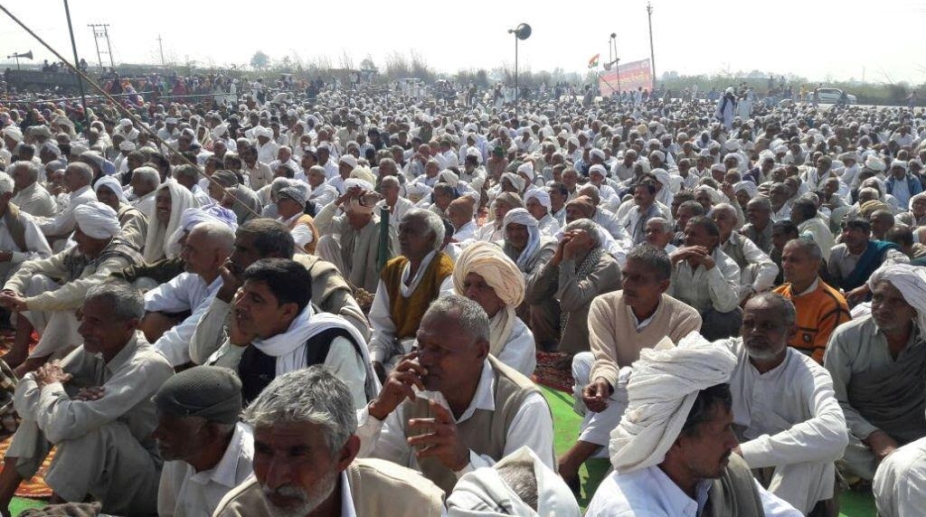Two ordinances related to agriculture have been passed after a 5-hour long debate on Thursday. The
Farmers’ Produce Trade and Commerce (Promotion and Facilitation) Bill, 2020 and The Farmers (Empowerment and Protection) Agreement of Price Assurance and Farm Services Bill, 2020 are passed by the lower house. Earlier on Tuesday, Lok Sabha has passed the Amendment in Essential Commodities Act. Passage of these bills leads to severe criticism of BJP even by its allies.

In a recent development, SAD( ally of BJP) Minister Harsimrat Kaur resigned from the Modi cabinet. At the same time, the opposition walked out of the house.
Amid the protest against bills, Prime Minister Narendra Modi said that the passage of historic agrarian reform bills in the Lok Sabha is an important moment for the farmers and agriculture sector of the country. This bill will truly free the farmers from middlemen and all obstacles.
Also read: Record 78 women MPs in new Lok Sabha
Allied party is also protesting
After the resignation of the Harsimrat Kaur the problem for the government in this matter has started to increase. Since the ordinance was introduced in the House on Thursday, the Shiromani Akali Dal has been opposing the bill ever since. When the bill was introduced in the Lok Sabha, Shiromani Akali Dal chief Sukhbir Singh Badal opposed it and said that Harsimrat Kaur will resign from the post of Union Food Processing and Industries Minister.

Why bills are Contentious?
Amid discussion on the bill in the House, Sukhbir Singh Badal said that the feelings of the farmers have been conveyed to the government. We have made a lot of effort to allay people’s fears, but this could not happen. Governments have worked hard in preparing the agricultural infrastructure in the state of Punjab and it has taken 50 years. This ordinance will ruin the 50 years of hard work of governments. The opposition parties also opposed these bills very out rightly. They believe that this law will weaken the MSP (Minimum Selling Price) system being given to the farmers as security of income. In such a situation, privatization will be encouraged and big companies will exploit the farmers.
What is in the bill?
The Farmers Produce Trade and Commerce (Promotion and Facilitation) Bill, 2020 provides for the creation of an eco-system where farmers and traders will be able to go to any state and sell their crops. According to this bill, it is not necessary that you sell crops only within the state boundaries.
On the other hand, if we talk about The Farmers (Empowerment and Protection) Agreement of Price Assurance and Farm Services Bill, 2020, it has a provision to prepare the nationwide structure on the agricultural agreement. That is, the aim of this bill is to provide an agreed profitable price structure in a transparent manner for the farmers, traders, exporters in the agricultural trade.
Highlights of the bills
- Under the Agricultural Produce Trade and Commerce (Promotion and Facilitation) Bill, 2020, farmers will be able to sell their produce in any corner of the country. If they are not getting a fair price or do not have a market facility in the state, then the farmer can take his crops to another state and sell the crops. Also, crops can be sold through online mediums and will get better prices.
- Under The Farmers (Empowerment and Protection) Agreement of Price Assurance and Farm Services Bill, the focus is to increase the income of farmers. Through this, the government wants to eliminate middlemen. So that the farmer gets a fair price. With this, the government is trying to create a supply chain.
- Under the Essential Commodities (Amendment) Bill, 2020, cereals, edible oils, potatoes and onions are removed from essential commodities list. The capping over these commodities has been removed. From this move, the government is trying to attract foreign investment in agriculture.
Why protest?

- In this, the farmers and other political parties say that if the role of mandis is ended, then the farmers will not get the minimum support price. Therefore there should be a nationwide MSP.
- Also, there is no mechanism to fix prices. Therefore, the concern of farmers and political parties is that private companies should not exploit the farmers.
- There is also a concern that traders will hoard crops after this amendment in the EC Act. This will create market instability and increase inflation.
- The state governments are also concerned that if the proper prices of the crops are not given in the state, then the farmers will be able to go to the neighbouring state and sell their crops. In such a situation, the state governments will face food shortage problems.
